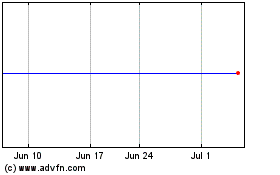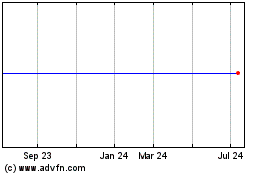Netanyahu Approves Deal to Develop Israel's Natural-Gas Fields
May 22 2016 - 12:20PM
Dow Jones News
By Orr Hirschauge and Rory Jones
TEL AVIV--Israel's Prime Minister Benjamin Netanyahu on Sunday
approved an amended deal to develop the country's natural-gas
fields after months of legal wrangling that has stunted the growth
of the domestic hydrocarbon industry.
Israel's highest court in March ruled against an initial
framework agreement to develop the country's offshore fields. It
called the deal unconstitutional, citing a clause in the agreement
that gave energy companies pricing and regulatory stability for 10
years regardless of potential shifts in the government.
The main stakeholders in the fields, U.S.-based Noble Energy
Inc. and Israeli partner Delek Group, had argued that the stability
clause was required for them to make the investments necessary to
develop the fields.
Mr. Netanyahu on Sunday said the clause had been removed from
the amended framework. An Israeli official said the government had
added another clause that said the gas companies would be
potentially compensated for any future changes in regulation.
"The important thing now isn't to delay," Mr. Netanyahu told his
weekly cabinet meeting.
The new deal gives Noble and Delek the green light to develop
Israel's largest offshore field and export the natural gas to new
markets such as Jordan, Turkey and Egypt, potentially deepening
ties between Israel and its regional neighbors.
The energy companies have already been through several rounds of
regulatory and legislative hurdles that have significantly delayed
development. In total, Israel sits on fields containing more than
32 trillion cubic feet of gas.
"This is an important milestone in creating a stable investment
environment," Noble Energy said in a statement.
Israeli officials say they hope the new framework won't face any
more legal or regulatory hurdles after the deal became highly
unpopular domestically.
Thousands of Israelis have protested the deal in the past year,
complaining it would line the coffers of big business. Israeli
consumers say it offers uncompetitive pricing compared with other
Western countries and sends too much gas outside Israel, an
energy-security risk.
"Instead of furthering the interests of Israeli citizens...the
government swiftly approves a framework that takes care of the
interests of the gas tycoons," Yossi Dorfman, one of the activists
opposing the deal, said Sunday.
In December, Mr. Netanyahu signed off on the deal, invoking an
antitrust clause for the first time to force it through on grounds
of national security. The Israeli leader said the development of
the gas reserves would enable Israel to develop economic ties with
its neighbors and strengthen national security.
In response to Mr. Netanyahu's decision, opposition lawmakers
filed a petition in Israel's highest court that objected to the
plans to circumvent the regulator. Mr. Netanyahu appeared before
the court in February to defend his move, the first-ever appearance
there by a sitting prime minister.
Write to Orr Hirschauge at Orr.Hirschauge@wsj.com and Rory Jones
at rory.jones@wsj.com
(END) Dow Jones Newswires
May 22, 2016 12:05 ET (16:05 GMT)
Copyright (c) 2016 Dow Jones & Company, Inc.
Noble Energy (NYSE:NBL)
Historical Stock Chart
From Mar 2024 to Apr 2024

Noble Energy (NYSE:NBL)
Historical Stock Chart
From Apr 2023 to Apr 2024
